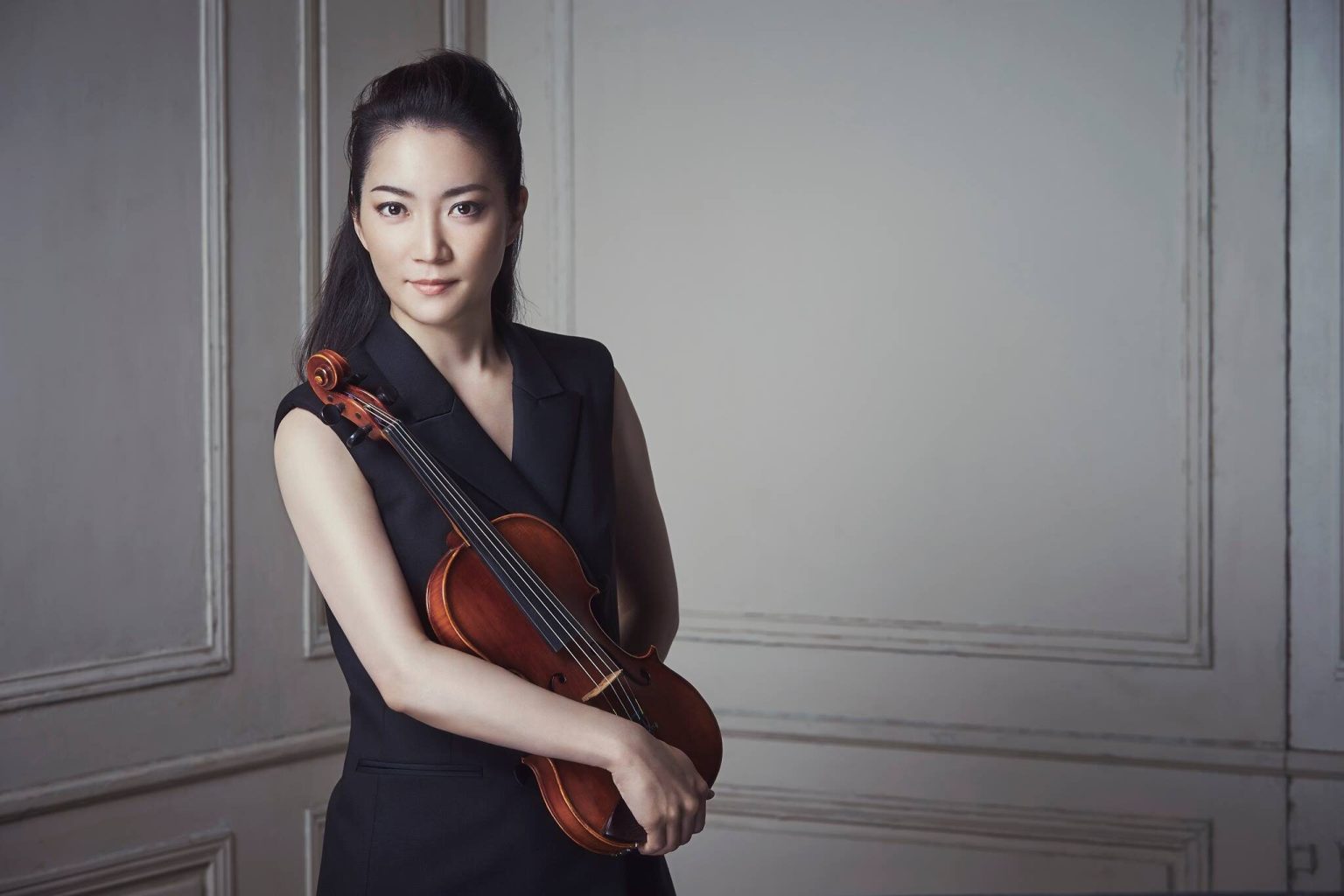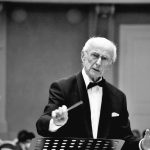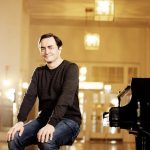interview by Kristýna Petišková
When did you first hear Berg’s Violin Concerto?
I was about fourteen. In Japan, where I’m from, the finals of an international competition were being held. I didn’t participate but I went to hear the others play. Five violinists made it to the final round, so I heard Berg’s concerto—arranged for violin and piano reduction—five times in a row.
What impression did it make on you back then?
I didn’t understand the piece at all, even though I already liked playing contemporary music. My repertoire back then included different pieces, which I took to competitions. I came to Berg later. As a child, I studied with the Japanese violinist Toshiya Eto, who had been taught at Curtis by the Russian-American violinist Efrem Zimbalist. I think it was partially thanks to this Russian-style training that I later won the Tchaikovsky Competition at sixteen.
You were the youngest winner of the competition at the time…
Yes, it was a surprise. I don’t come from a musical family. I had no idea what a professional musician’s life entailed. But I had an open mind, and Japanese culture felt too conservative for me. I originally wanted to study in Moscow. That’s one reason I entered the Tchaikovsky Competition. But it wasn’t possible—I’d have had to come from either a very wealthy family or from North Korea. So shortly after winning the competition, I went to New York. I studied at Juilliard and also attended political science and history seminars at Columbia University. I’ve always been drawn to Europe, and that’s where I’ve made my home for the past twenty-five years, in Paris.
Why did you choose to study history and political science?
Because history, politics and music are connected. It wasn’t enough for me to just play well. I wanted to better understand how the events of the 20th century influenced composers, how political situations were reflected in their thinking and music.
That also influences how one interprets their works…
I remember in 1989, when I took part in the Queen Elisabeth Competition, I was deeply struck by the Russian players. Three came, accompanied by their teachers, accompanists, drivers, even KGB agents. The rest of us stayed with host families, but they stayed in a hotel. Twelve of us made it to the finals. We were assigned a new piece to learn and spent some time living in the same building. The Russians practiced constantly and obsessively in the neighboring rooms. I wasn’t taking the competition too seriously—I just wanted to play—but to them, it seemed like their life depended on winning. I felt like the agents were breathing down their necks. One of the violinists was Vadim Repin. He practiced day and night. It felt like he had nightmares that forced him to wake up and play. He played at 2 a.m., 4 a.m., nonstop! One participant mentioned the ongoing Perestroika and how hopeful he was about the future. Then the Soviet Union collapsed, and everything changed. I wanted to understand all that better, which is why I chose to study political science and history.
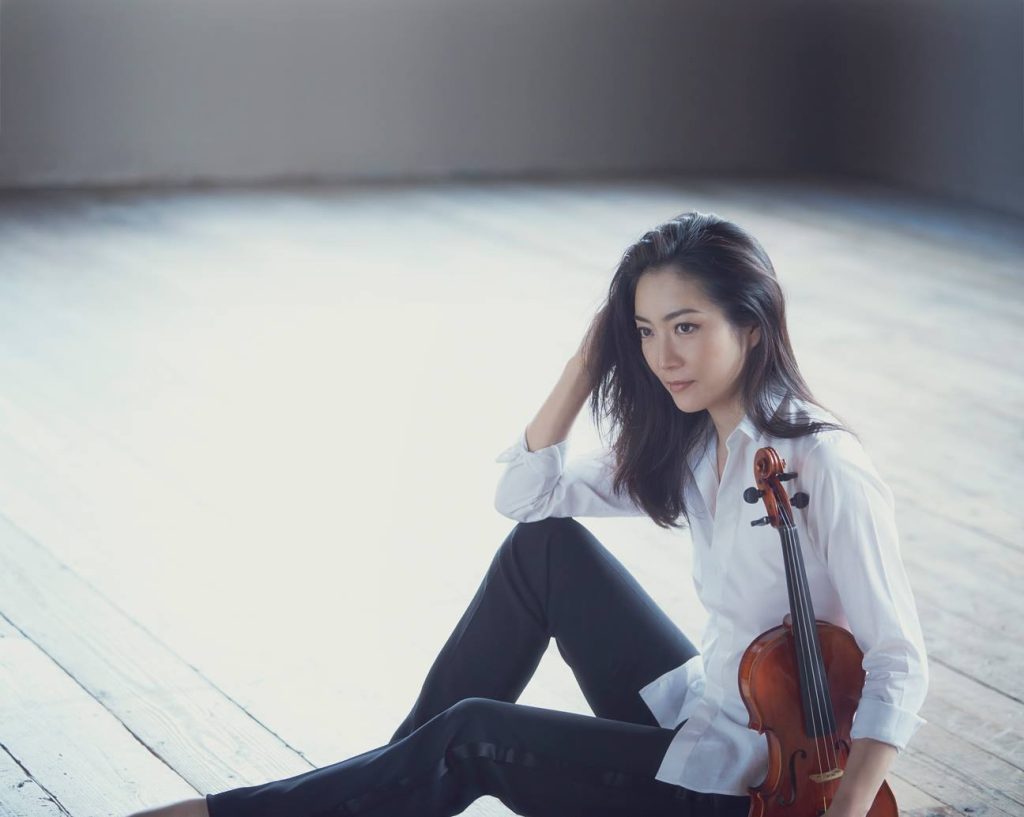
Returning to Berg, he too faced some difficulties…
Yes. He was Aryan, but he had problems with the Nazis because of his twelve-tone music, which he studied under Schoenberg. I appreciate that through studying both music and politics, I can view human stories from different perspectives. In the U.S., I met many Jewish musicians who had fled Europe during the war—such as pianist Rudolf Serkin, who founded the Marlboro Music Festival in Vermont. I used to play chamber music there with people like András Schiff and György Kurtág. During this period I started practicing Berg’s Violin Concerto for the first time.
I see you brought a booklet of the recording where Anton Webern conducts Berg’s concerto, with Louis Krasner on violin…
Yes, Krasner premiered the concerto. I was lucky enough to meet him when he was 91. I visited his home to play the concerto for him but he said: “If you want to play Berg we need to start with a Mozart violin concerto.” I wasn’t prepared at all, but I had no choice! So I started playing Mozart’s Fifth Violin Concerto, and he accompanied me from memory. After about seven minutes, he stopped and said: “Now we can move on to Berg.” He explained that since Berg was born in Vienna, his music naturally stems from Viennese musical tradition. So if I wanted to truly understand Berg, I had to understand Mozart. And that applies to all music—it all builds on what came before. After ninety minutes, he said: “That’s enough. Come back when you feel ready.” Three weeks later, he passed away. But that one visit had a deep impact on me. He told me so many stories about Berg and Webern.
Can you share one of those stories?
For example, he told me the concerto premiered in Spain because it wasn’t allowed to be performed in Germany. Originally, Webern was supposed to conduct, but during rehearsals, he kept stopping the orchestra after every note—he was a total perfectionist. The musicians got so fed up that they hired a different conductor! This new conductor, who was a Berg expert, invited Krasner to his hotel the day before the concert to play the violin part. Krasner brought the full score, planning to play with the music. The conductor kept yelling that he was playing too loud, so Krasner backed away further and further until he ended up in a corner, playing from memory. At the dress rehearsal the next day, he brought the score again, but the conductor closed it and said, “You managed yesterday without it, so why not today?” He insisted Krasner had to know the music by heart to perform it from within—and only then could he truly communicate it to the audience. So Krasner played the concert from memory. It must have been extremely stressful—it’s a very difficult piece to memorize.
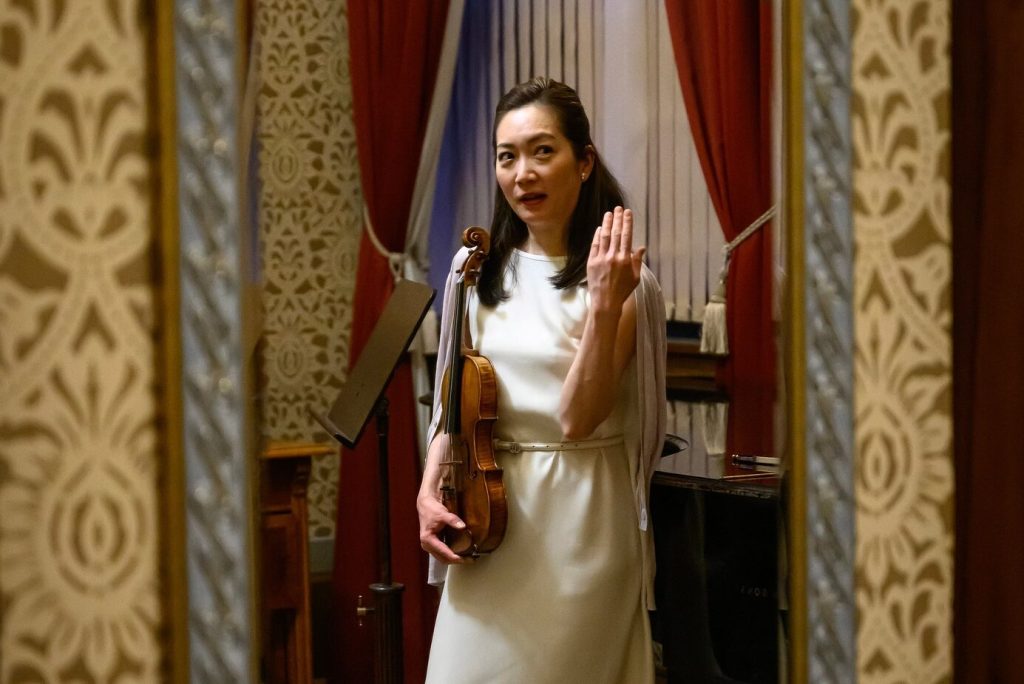
You also play it from memory…
Yes, I do, even though it’s challenging. I agree that one must know the concerto intimately for it to have the depth with which it was written.
I listened to your moving recording of the concerto with the Gustav Mahler Youth Orchestra conducted by Pierre Boulez…
To play it with them, I had to audition and perform it directly for Boulez. Luckily, he was satisfied, and two years later we performed it together. But there was a catch—he claimed many of the notes in the score were written incorrectly. I ended up trusting him, since he was an excellent composer and the concerto is written in a strict twelve-tone system. But it felt strange, as if I were deliberately playing “wrong” notes.
Do you think Berg didn’t have time to review the concerto properly before he died?
Yes. He composed it incredibly quickly, almost as if in a trance. The whole piece has a mystical quality, especially with the Bach chorale quotation at the end, written in accordance with the twelve-tone technique.
And you play both contemporary and early music…
As I mentioned, you can’t separate contemporary music from older music. I enjoy all musical styles, not just classical. I especially like contemporary works because one can talk directly with the composers. In the past, composers often performed their own music, but today that’s rare—so collaboration is even more important.
You founded the NIPPON Music Festival in Japan thirteen years ago…
Yes, I started it for my 40th birthday. Besides premiering new works, we offer masterclasses and charity concerts. I also try to give young musicians opportunities to get noticed. Not everyone is lucky enough to win a major competition or meet the right people at the right time. I’m happy it’s working out—by chance, today at the Prague Spring Festival, a cellist who once played at my festival is in the finals. It was ten years ago—we played Tchaikovsky’s Souvenir de Florence at a charity concert to raise funds after the earthquake. Another Japanese cellist who played that concert is now studying in Paris. It brings me great joy to see that my efforts are having an impact.
When did you first visit the Czech Republic?
Long ago, in 1993, just after Czechoslovakia split. I came because of Josef Suk—I had the chance to study with him. I ended up spending about a week in Prague, stayed in the dorms of Charles University and traveled to his house for violin lessons.
Why did you want to study with Josef Suk?
Though I don’t come from a musical family, we had lots of LPs at home, including Handel’s violin sonatas and Brahms’s Violin Concerto played by Josef Suk. I listened to them often. I admired his distinctive sound, influenced by Slavic culture. I wanted to be shaped by that too—or at least understand it better.
You’re a sought-after violinist, yet you keep your distance from the media and social networks…
It doesn’t come naturally to me to seek the spotlight. I created an Instagram account years ago, but I’ve only posted about five times.
It’s refreshing to see that a musician can still be successful without constant self-promotion.
After winning the Tchaikovsky Competition at eighteen, I went through a difficult period. Until then, nobody noticed me. Then suddenly, everyone wanted a piece of me. Reporters from the BBC and NHK came, and since I was the youngest winner, they aired glowing coverage. It was probably even worse than today. People stalked me, took photos on the street, and even tried to get to our house! But then I moved to New York, and things quieted down. I was lucky I could continue developing my career and still perform solo today.
Yet in Prague, you agreed to three interviews!
I have a warm, nostalgic connection to the Czech Republic—so probably that’s why.
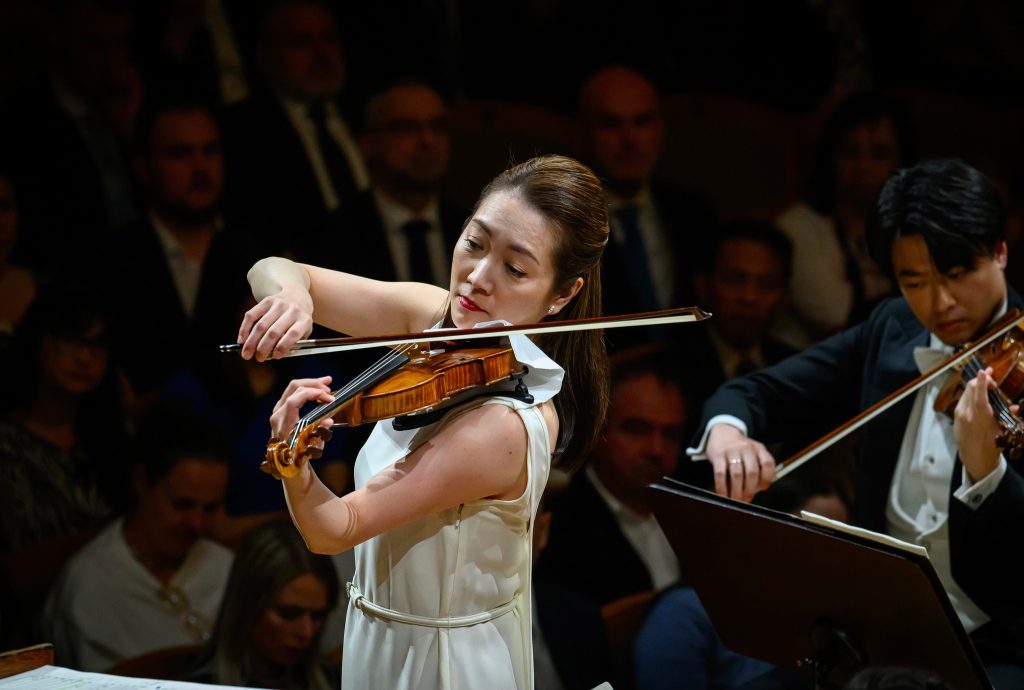
You seem very composed, like someone who knows how to manage her energy and avoid burnout.
Really? I’m not sure, but yes, I try.
How so?
It’s changed over time. I used to rely heavily on my technique and physical strength—I practiced a lot and thought I always would. But as you get older, strength declines, and pain increases. So now I approach the violin—and myself—anew every day. I try to sense how to work with myself best. I still practice a lot, but not always physically. Often, I practice in my mind through visualization. I don’t have the physical stamina of my youth, but I’m more mature, wiser, and mentally stronger. I’m not afraid to take risks in performance like I once was. I’ve built a reputation and no longer feel I have to constantly prove myself.
Since last year, you’ve also been teaching at Berlin University of the Arts, where you once studied yourself.
Yes, it’s my first teaching job! I have twelve students in my class, all pursuing master’s degrees. I couldn’t teach younger students—they need weekly lessons. When I do something, I want to give it my full attention.
Is that also why you focus solely on solo playing?
In my youth, I played chamber music and even played in orchestras. I enjoyed both, especially because I got to play with amazing musicians—when I was in the orchestra, it was for instance under Seiji Ozawa with Mstislav Rostropovich as the soloist. So I can’t say I only enjoy solo playing. But I quickly realized that each form of playing requires a different style, a different sound. In an orchestra, you have to blend in; in chamber music, you rehearse parts together. I can’t easily switch between orchestral, chamber, and solo playing styles. The same goes for teaching and even life. I can focus on only one thing at a time. When I do something, I want to give it my all. That’s why I focus exclusively on solo performance.
Thank you for such a thoughtful and inspiring interview!


